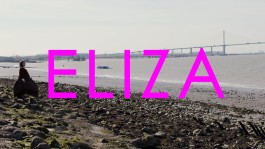
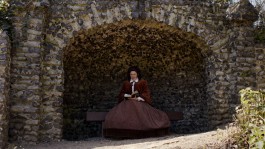
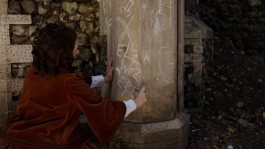
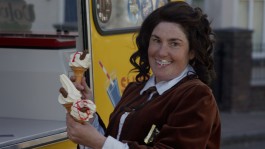
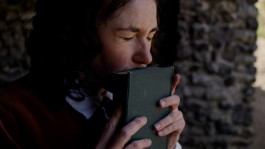

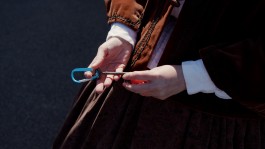
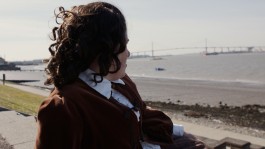
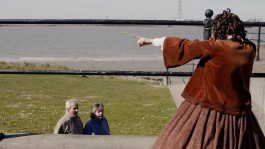
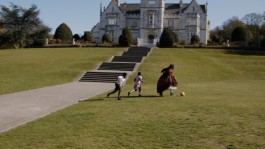
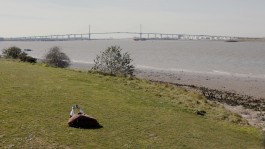
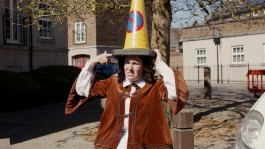
Appropriating a mockumentary format, ELIZA is inspired by the lesser known, lesbian, working class, Victorian, 'poet of the people' Eliza Cook. Like unfolding a game of exquisite corpse to reveal an Alan Partridge style commentator, in the get up of a 19th century woman, with the cadence of a camp northerner: ELIZA drags both the viewer, the unsuspecting public and the artist back and forth through time to explore the overlapping edges of redevelopment, place and queer temporalities. Commissioned by Cement fields + Estuary festival, 2021
Like unfolding a game of exquisite corpse to produce the get up of a 19th century working class woman, the presence of Alan Partridge giving a tour of the home counties and the cadence of a camp northerner: ELIZA drags both the viewer, the unsuspecting public and the artist back and forth through time.
As the film’s name sake, the other kind of drag also originated in the 1800’s. When male performers wore petticoats to perform as women their petticoats would drag on the floor, so they referred to dressing up as women as “putting on their drags.” Since adopted by the gays, drag has historically served to inhabit, inflate and interrogate performances of gender and other fantasies. In ELIZA, Ames turns this technique on the unlikely but overlapping edges of development, place and queer histories (puts a bike pump into them, dons a coiffed wig and crawls inside).
Calling upon the character of Eliza Cook, a Victorian poet from Bermondsey with a ‘love for women’ that championed education for all, the Ames/Eliza hybrid takes us around Ingress Abbey - a stately home now swallowed by a housing estate - where Eliza wrote much of her work. Hybridity has also had its uses in queer history, assembling and gathering the parts of presentation you like and cobbling together something new, capable of slipping between. The artist's performance of Eliza is as though to draw a silhouette of the character and of Ames themselves over one another as a venn diagram. With the overlapping centre of Eliza as a self taught poet, Ames as self taught artist, both as queer, from working class backgrounds… but leaving room for the differences to seep out. Embodying a spillage of one moment of time into another and back again, messing with simultaneity to create ‘queer asynchronies’ Elizabeth Freeman) like ruptures in the way things are or should be. All the while settling in the rather familiar and comfortable to camera style mockumentary tropes - crash zooms and The Office type gotchya’s abound.
As in many ways Eliza was for her own time (a lesbian, a female working class writer), Ames’ performance is anachronistic to the modern day Ingress Abbey. Asking passersby if the Dartford Crossing is a drawbridge, pondering if nitrous oxide canisters could be solid silver and holding their petticoat up to run for the ice cream van. Mirroring the very incongruousness of the Abbey itself - a neo-gothic Jacobean-style 18th century country house now nestled amongst a 90’s interpretation of Victorian style homes, complete with driveways and double glazing of course. As if the same person that was responsible for casting Eliza with a Sheffield(ish) accent had about as much budget for the set, but it's real and people actually live there.
Ever shifting, the tour oscillates between a slightly sycophantic autobiopic (Ames/Eliza reading from their favourites of her own poems and detailing love affairs with actresses that didn’t turn out so well), to BBC social commentator or property developer selling you their dream of town planning. At once imagining what Eliza would have made of such an area with no social housing, whilst painting a sunny picture of an area where ‘everyone is just so friendly, you just don’t get this everywhere you know’. With development conglomerates setting their peepers on North Kent as London’s next overspill site Eliza/Ames pulls the viewer through the icky grey feeling of ever engulfing social and geographical redevelopment and change. Here Ames deftly draws the politics out of the ways areas, as bodies, can be classed, cleansed and gentrified. At the start of this short film, Ames/Eliza are literally and metaphorically locked out of the building and its history, and forced to give a tour from its periphery. As they say, ‘you have to look for the queer stories in the cracks’, and marginalised stories are often better told from the margins.